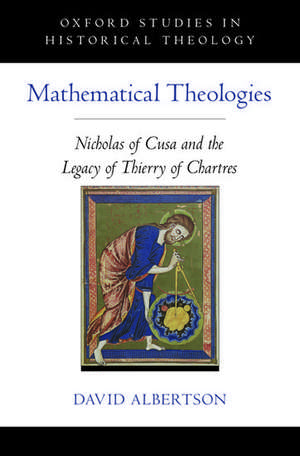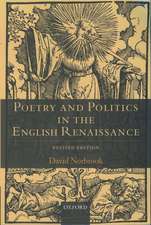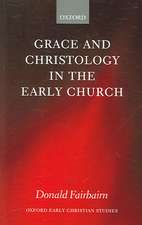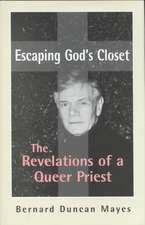Mathematical Theologies: Nicholas of Cusa and the Legacy of Thierry of Chartres: Oxford Studies in Historical Theology
Autor David Albertsonen Limba Engleză Hardback – 10 iul 2014
Din seria Oxford Studies in Historical Theology
- 18%
 Preț: 642.63 lei
Preț: 642.63 lei - 22%
 Preț: 204.12 lei
Preț: 204.12 lei - 27%
 Preț: 447.84 lei
Preț: 447.84 lei - 28%
 Preț: 444.47 lei
Preț: 444.47 lei - 12%
 Preț: 560.56 lei
Preț: 560.56 lei - 13%
 Preț: 557.48 lei
Preț: 557.48 lei - 15%
 Preț: 433.91 lei
Preț: 433.91 lei - 30%
 Preț: 518.26 lei
Preț: 518.26 lei - 13%
 Preț: 616.99 lei
Preț: 616.99 lei - 13%
 Preț: 556.67 lei
Preț: 556.67 lei - 13%
 Preț: 558.29 lei
Preț: 558.29 lei - 23%
 Preț: 737.47 lei
Preț: 737.47 lei - 28%
 Preț: 443.45 lei
Preț: 443.45 lei - 22%
 Preț: 497.47 lei
Preț: 497.47 lei - 15%
 Preț: 543.19 lei
Preț: 543.19 lei - 13%
 Preț: 661.15 lei
Preț: 661.15 lei - 22%
 Preț: 497.88 lei
Preț: 497.88 lei - 24%
 Preț: 489.69 lei
Preț: 489.69 lei - 13%
 Preț: 557.48 lei
Preț: 557.48 lei - 14%
 Preț: 673.30 lei
Preț: 673.30 lei - 27%
 Preț: 575.38 lei
Preț: 575.38 lei - 30%
 Preț: 628.72 lei
Preț: 628.72 lei - 47%
 Preț: 684.90 lei
Preț: 684.90 lei - 27%
 Preț: 646.17 lei
Preț: 646.17 lei - 30%
 Preț: 579.18 lei
Preț: 579.18 lei - 48%
 Preț: 713.94 lei
Preț: 713.94 lei -
 Preț: 336.82 lei
Preț: 336.82 lei - 30%
 Preț: 550.82 lei
Preț: 550.82 lei - 30%
 Preț: 627.50 lei
Preț: 627.50 lei -
 Preț: 274.26 lei
Preț: 274.26 lei -
 Preț: 287.13 lei
Preț: 287.13 lei - 46%
 Preț: 645.49 lei
Preț: 645.49 lei - 25%
 Preț: 660.41 lei
Preț: 660.41 lei - 28%
 Preț: 472.48 lei
Preț: 472.48 lei -
 Preț: 323.95 lei
Preț: 323.95 lei - 22%
 Preț: 449.24 lei
Preț: 449.24 lei -
 Preț: 321.01 lei
Preț: 321.01 lei - 13%
 Preț: 379.96 lei
Preț: 379.96 lei - 31%
 Preț: 787.85 lei
Preț: 787.85 lei - 31%
 Preț: 904.58 lei
Preț: 904.58 lei - 18%
 Preț: 341.80 lei
Preț: 341.80 lei - 30%
 Preț: 532.21 lei
Preț: 532.21 lei - 31%
 Preț: 933.26 lei
Preț: 933.26 lei - 30%
 Preț: 552.45 lei
Preț: 552.45 lei - 13%
 Preț: 688.24 lei
Preț: 688.24 lei - 31%
 Preț: 875.55 lei
Preț: 875.55 lei
Preț: 632.58 lei
Preț vechi: 836.60 lei
-24% Nou
Puncte Express: 949
Preț estimativ în valută:
121.10€ • 126.06$ • 99.70£
121.10€ • 126.06$ • 99.70£
Carte tipărită la comandă
Livrare economică 20-27 ianuarie 25
Preluare comenzi: 021 569.72.76
Specificații
ISBN-13: 9780199989737
ISBN-10: 0199989737
Pagini: 512
Dimensiuni: 236 x 163 x 43 mm
Greutate: 0.85 kg
Editura: Oxford University Press
Colecția OUP USA
Seria Oxford Studies in Historical Theology
Locul publicării:New York, United States
ISBN-10: 0199989737
Pagini: 512
Dimensiuni: 236 x 163 x 43 mm
Greutate: 0.85 kg
Editura: Oxford University Press
Colecția OUP USA
Seria Oxford Studies in Historical Theology
Locul publicării:New York, United States
Recenzii
This is the most insightful and learned monograph on Nicholas of Cusa to appear in the last decade. Cusanus scholars will have to grapple with his new reading of the Chartrian lines of influence, including his brilliant insight into Nicholas's alleged forgery. Even more exciting is the new sketch for the pre-history of today's debates about science and theology. Are the intellectual presuppositions of our spiritual a-cosmism only to be found within the age of Galileo or can the ancient and medieval synthesis of arithmetic and Incarnation still speak to us? Albertson adds considerable depth and light to that pressing discussion.
The heritage of Pythagoras has influenced Western thought for two-and-a-half millennia. One of the neglected aspects of this tradition was the development of Christian Neopythagoreanism in Late Antiquity and its rebirth in the twelfth century with the early scholastic Thierry of Chartres. David Albertson's wide-ranging and impressive book uncovers the significance of Thierry's mathematical theology and demonstrates its powerful influence on the Renaissance Cardinal and speculative thinker Nicholas of Cusa. Mathematical Theologies is a ground-breaking study in the history of Western theology and a major new interpretation of Cusanus.
Mathematization is usually regarded as the central element in the transition from medieval theology to modern science. David Albertsons genealogical study of the roots of Nicholas of Cusas thought in the Christian Neopythagoreanism of Thierry of Chartres demonstrates that theology and mathematics did not always go separate ways. What if, in our age of unprecedented quantification, Word and Number could be made to meet once again? That is the provocative question of this brilliant book.
This book is a brilliant example of how much the history of ideas can still add to the history of practices, especially scholarly practices.
The heritage of Pythagoras has influenced Western thought for two-and-a-half millennia. One of the neglected aspects of this tradition was the development of Christian Neopythagoreanism in Late Antiquity and its rebirth in the twelfth century with the early scholastic Thierry of Chartres. David Albertson's wide-ranging and impressive book uncovers the significance of Thierry's mathematical theology and demonstrates its powerful influence on the Renaissance Cardinal and speculative thinker Nicholas of Cusa. Mathematical Theologies is a ground-breaking study in the history of Western theology and a major new interpretation of Cusanus.
Mathematization is usually regarded as the central element in the transition from medieval theology to modern science. David Albertsons genealogical study of the roots of Nicholas of Cusas thought in the Christian Neopythagoreanism of Thierry of Chartres demonstrates that theology and mathematics did not always go separate ways. What if, in our age of unprecedented quantification, Word and Number could be made to meet once again? That is the provocative question of this brilliant book.
This book is a brilliant example of how much the history of ideas can still add to the history of practices, especially scholarly practices.
Notă biografică
David Albertson studies medieval and early modern Christianity as Assistant Professor of Religion at the University of Southern California in Los Angeles. After finishing degrees at Stanford University and the University of Chicago, he has held research fellowships at the University of Cologne and The Huntington Library.















